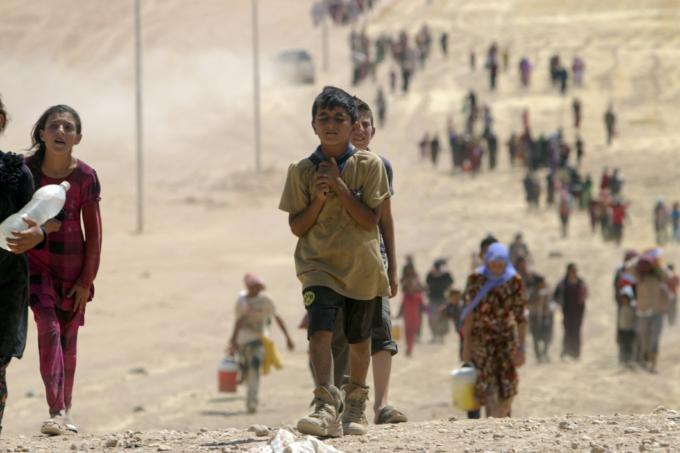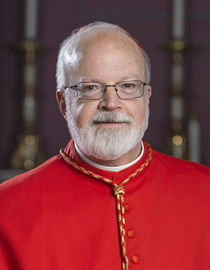
Culture
We cannot afford to be sloppy about security, but we must guard against letting the darkness of hatred and prejudice poison our own hearts.

O'Malley
Terrorism has taken a great toll in our world. Many innocent people have lost their lives, leaving families, friends and communities racked in pain, consumed by a sense of loss and disbelief. The victims who are killed, shot or injured in terrorist attacks are but the tip of the iceberg. The entire community is affected by these terrible events. People are fearful about travel, or gathering in large numbers. Strangers are looked upon with suspicion and whole classes of people are demonized.
One of the most pernicious effects of terrorism is that it can instill prejudices and group hatred in people's hearts and minds. All of us are horrified by the evil perpetrated by radical terrorists, but we must not let their inhumanity rob us of our humanity. During the Second World War, Japanese Americans were herded into concentration camps simply because they were of a particular ethnic group. This very un-American reaction was spurred by people's fear. Fear can cause us to do terrible and stupid things.
We cannot afford to be sloppy about security, but we must guard against letting the darkness of hatred and prejudice poison our own hearts. Since there are so few Muslims in our country, it is likely that there are many Americans who don't have any Muslim friends or even know anyone personally who professes Islam. American Muslims are much less apt to be radicalized than their European counterparts. The Muslims here are economically better off, better educated and much better integrated into the mainstream. And although Muslims comprise only 1 percent of our population, 10 percent of our doctors (20,000) in the United States are Muslim. My own dentist, here in Boston, is Iranian and Muslim.
While more than 5,000 Europeans have joined the Islamic State, fewer than 250 Americans are thought to have tried to, of whom it is estimated only two dozen succeed. Almost half of the jihadist plots hatched in the United States since 2001 have been foiled by our law enforcement agencies because they were reported by suspicious Muslims who were anxious to prevent any terrorist activities. One of the most dramatic cases involved the parents of a 16-year-old youth, Ali Amin, who reported their son's interest in IS. In August the young man was sentenced to 11 years in prison after pleading guilty to fundraising for IS and helping another American teenager to join.
Christian and Muslim Arabs in the Middle East are suffering incredible hardships because of sectarian violence. Among these Arabs are our own Catholic brothers and sisters who are truly martyrs, willing to sacrifice all rather than renounce their faith in Jesus Christ. Pope Francis insisted on visiting Central Africa despite the heavy objections because he was anxious to call people to reconciliation and dialogue. The people there found so much comfort in his words and his presence. Peace in the Middle East and in our own country can be achieved only if people of goodwill actively seek ways to strengthen community and overcome divisions and prejudices.
This Year of Mercy is an invitation to live our faith more fully by seeking ways to reflect God's love and mercy in the way that we treat each other. In the beautiful parable of the Good Samaritan, Jesus teaches us that the true neighbor is the one who shows mercy. In the case of the Samaritan, it was not just a matter of reacting with compassion in the face of a suffering human being, it also required him to overcome any personal prejudice or animosity that he would have felt towards the religion and ethnicity of the wounded man. The Samaritans felt rejected and despised by the people of the chosen race, and often reacted accordingly, as when they refused Jesus and the Apostles hospitality. There was a Cold War between the Samaritans and the Israelites, and so the Samaritan's act of kindness was at the same time an act of forgiveness, an act of renouncing prejudice and group hatred. Jesus ends the parable by saying: "Go and do likewise."
As we mull over the debate about refugees, let us remember the doors that were closed in the face of Mary and Joseph in Bethlehem. We must ask our leaders to be vigilant and protect our citizens, but at the same time we cannot turn our back on so many innocent people who are hungry, homeless, and without a country. I do not believe it is a matter of choosing one course over the other, we can be both vigilant and compassionate. America is truly great when we do not succumb to fear and prejudice, but rather when we walk boldly in the path of the Good Samaritan.
- Cardinal Seán P. O'Malley, OFM Cap. Is Archbishop of Boston
Recent articles in the Culture & Events section
-
Scripture Reflection for April 14, 2024, Third Sunday of EasterDeacon Greg Kandra
-
St. Helena's House is established in the South EndThomas Lester
-
Is this synodality?Russell Shaw
-
Poking the hornet's nest of IVFFather Tadeusz Pacholczyk
-
A eucharistic word: MissionMichael R. Heinlein


















